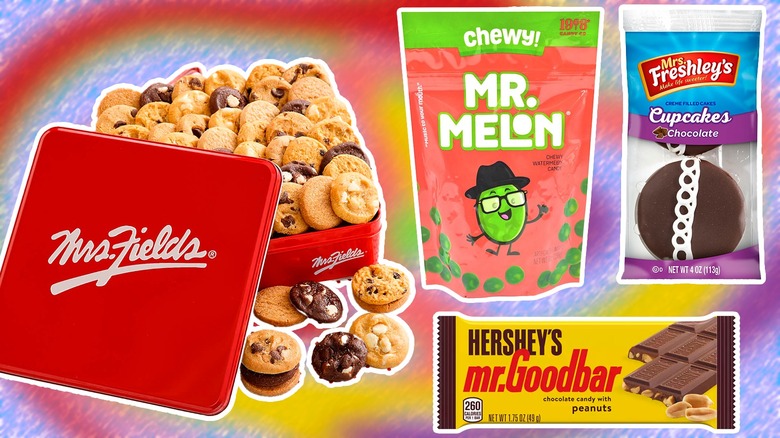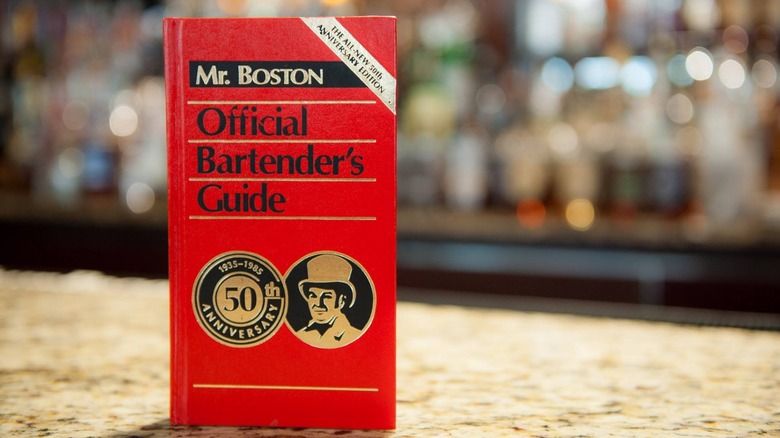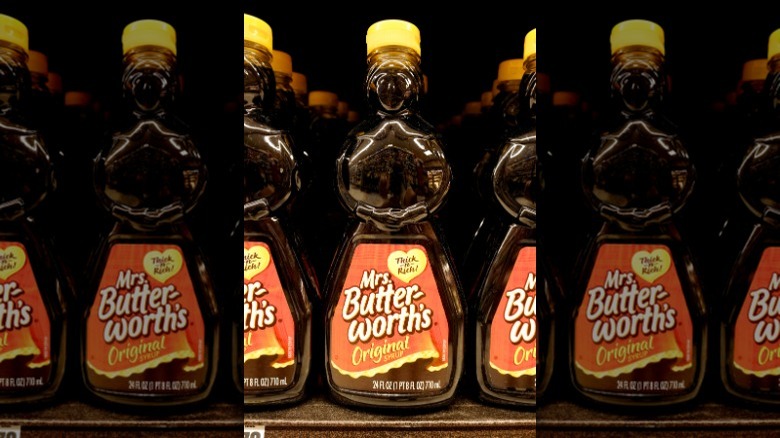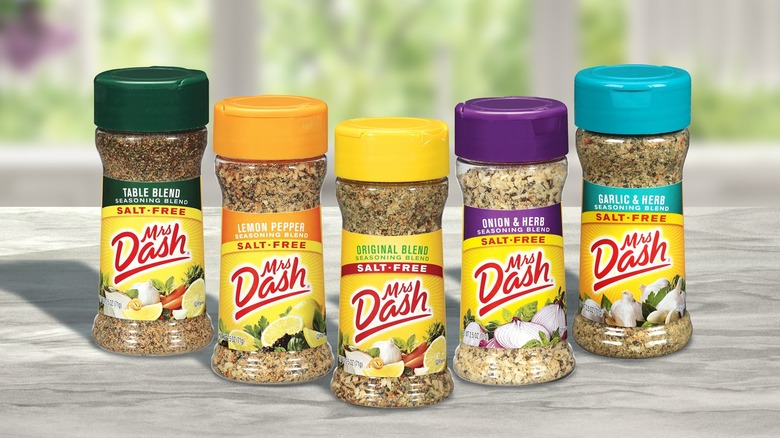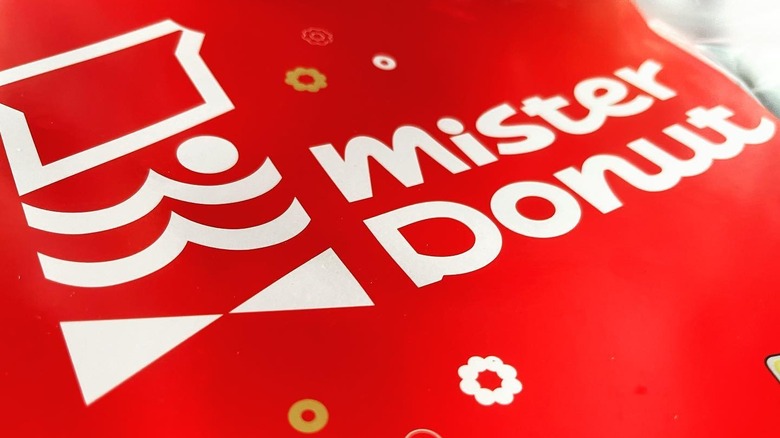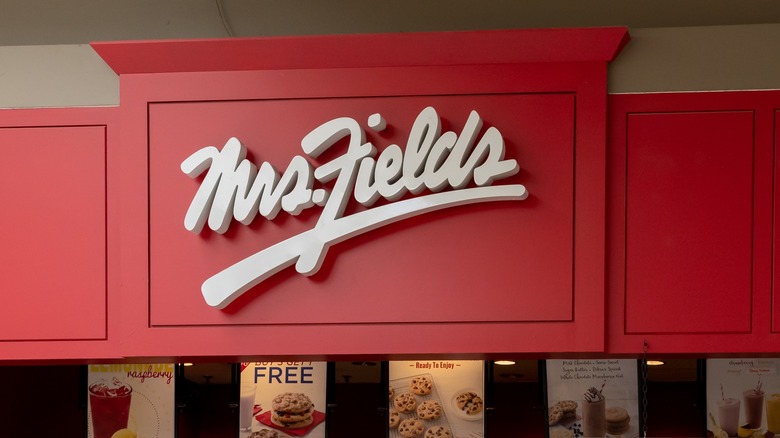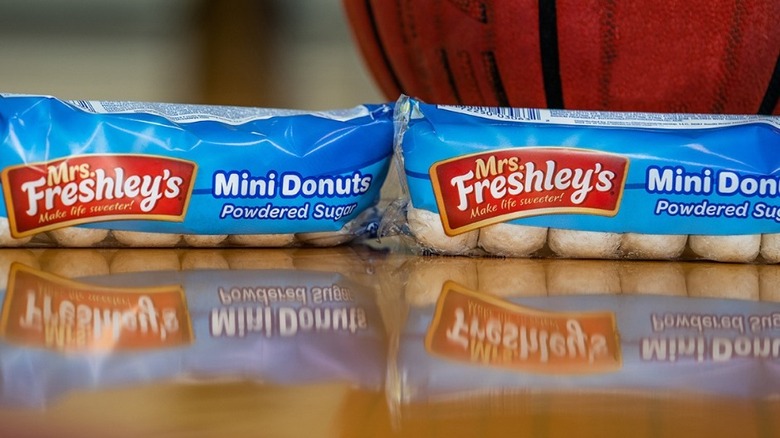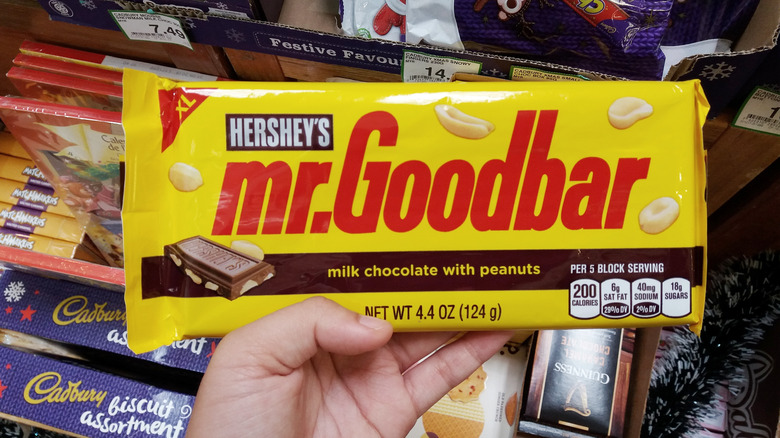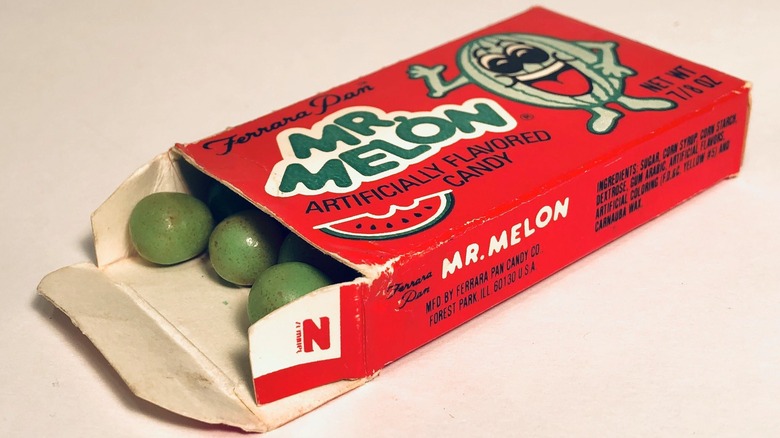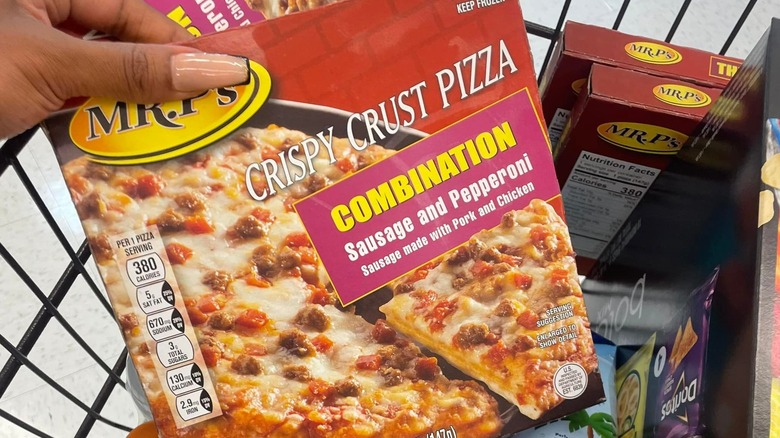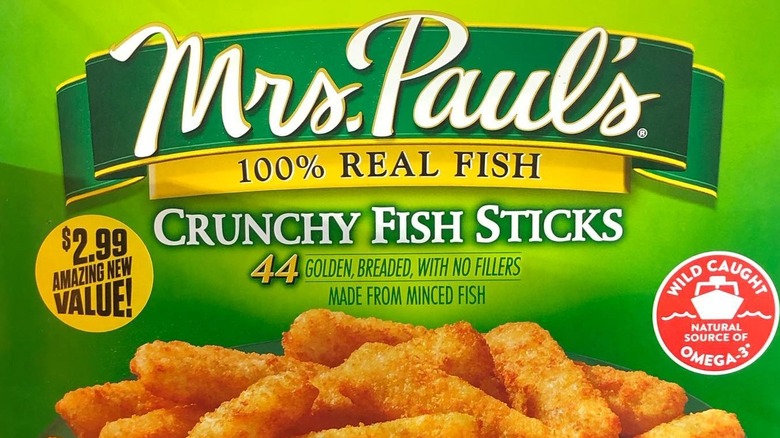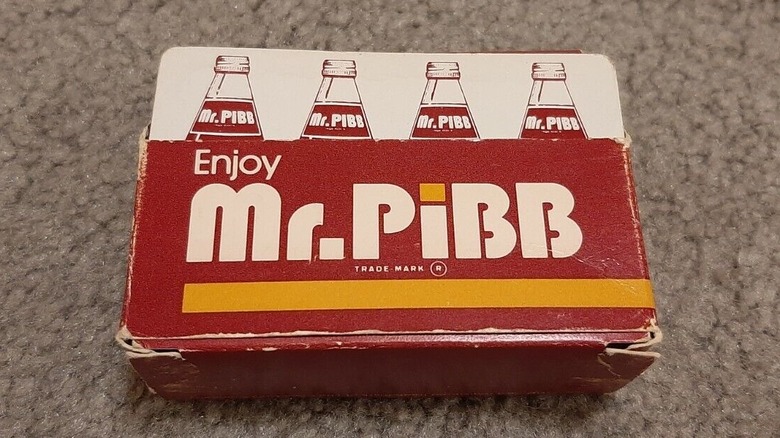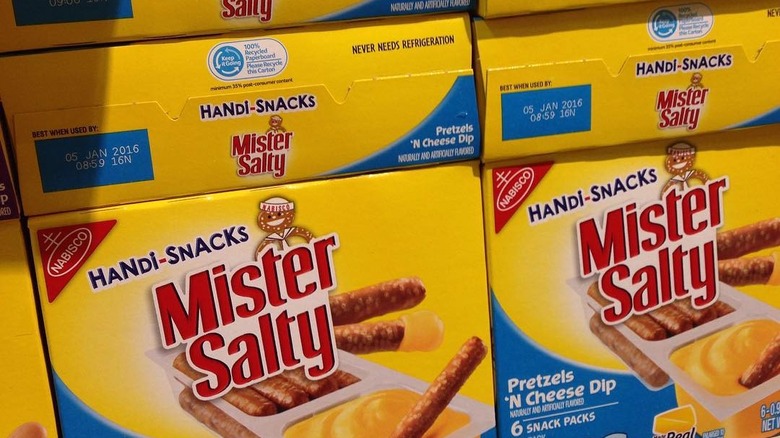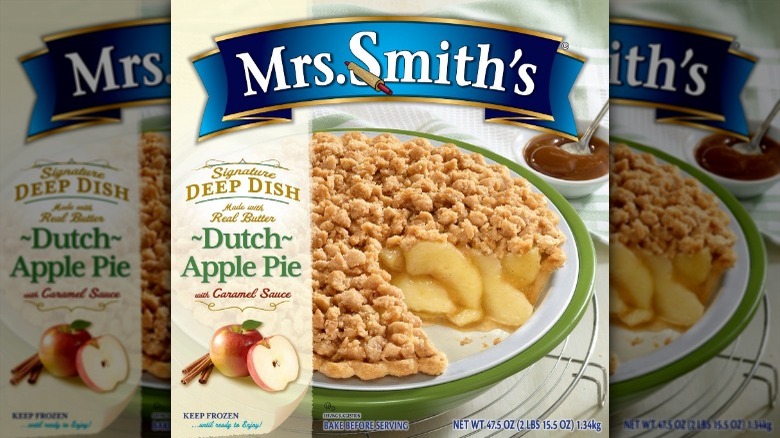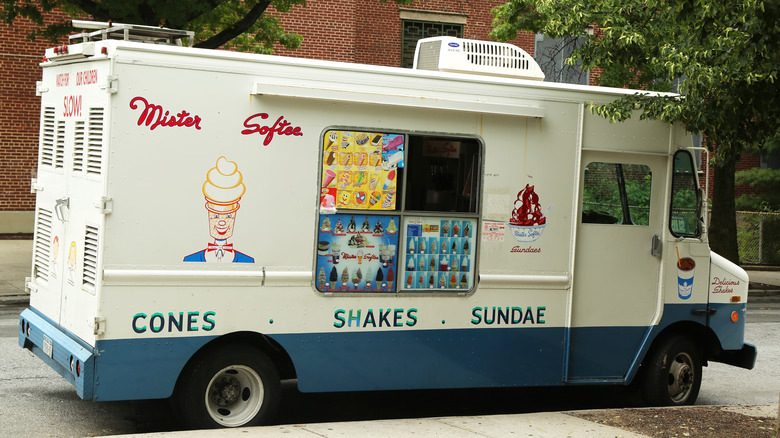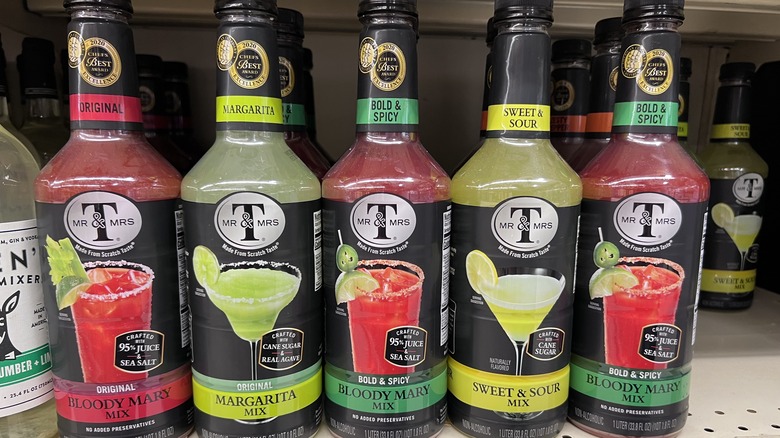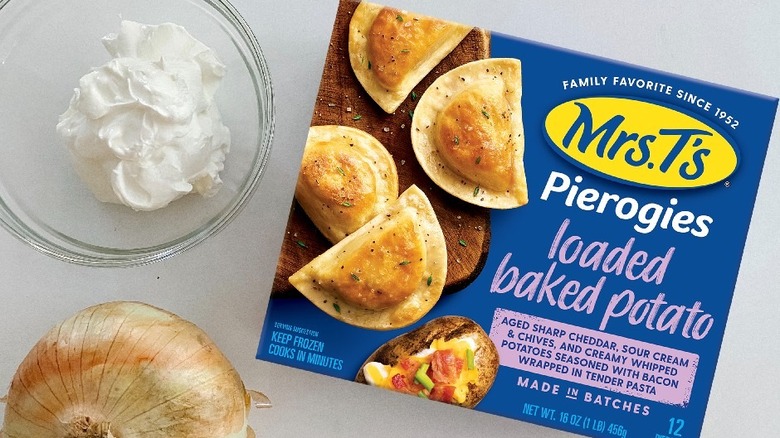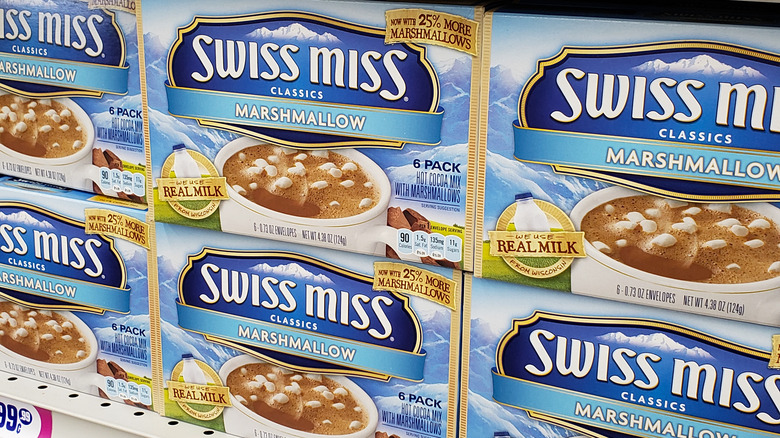The Wide World Of Foods And Drinks With Mr. And Mrs. In The Name
What is it with products that start with Mr. or Mrs. that lure us in to buy them and embrace the brand's manufactured personalities? Although gender stereotypes associated with these brands are outdated, they factored heavily into their production and marketing. "Mr." products were meant to carry a sense of authority, class, and refined masculinity. On the other hand, "Mrs." products supposedly created an image of high quality and homemade care. As Mrs. Fields said in her biography "One Smart Cookie," the prefix Mrs. on food labels conjures images of "women who are wise in the ways of the kitchen" like "an old-fashioned baking lady who puts in a pinch of this and a scant cup of that.'"
Some of these products and companies have these named due to their founder — or even in honor of their mother's invention. In other cases, the reason for these proper name brands ranges from clever to downright irreverent. Mr. and Mrs.-branded products have endured over time to thrive in supermarkets, restaurants, bars, ice cream trucks, and live in your kitchen cabinets. Let's travel the wide world of foods and drinks that have Mr. and Mrs. in their name to discover the real — or unreal — people behind these commercial products.
Mr. Boston
Bostonians Irwin "Red" Benjamin and Hyman C. Berkowitz formed the company Ben-Burk, which supplied syrups and bottling supplies during prohibition. When prohibition became repealed in 1933, they bought a distillery and crafted gins, whiskeys, and other spirits under the name Old Mr. Boston. Two years later, the company released its first edition of the "Old Mr. Boston Deluxe Official Bartender's Guide." Edited by Leo Cotton, the book was a collaboration with "four old-time Boston Bartenders whose background and experience make them authorities on the correct ingredients to be used and the proper manner of serving cocktails (via Mr. Boston)."
Cotton continued to edit the Bartender's Guide that ran the gamut (and the gimlet) from "Alabama Fizz" to "Zaza Cocktail" through its 49th edition. He retired in 1970. By that time, Glenmore owned the company, liquors, and guide. It removed "Old" from the brand name. In 1987, the company ditched the "Mr." as well — sending the hat-wearing Bostonian gentleman logo into retirement, too.
Under the current stewardship of the Sazerac Company, Mr. Boston continues to stamp his good name on bottles of alcohol and the red cocktail bible he made so famous. The title is now available in a digital form with a more modern logo to match the current age.
Mrs. Butterworth's
When the Lever Brothers Company introduced its Mrs. Butter-worth's in 1960, they emphasized the "butter" content by hyphenating her name on the apron-shaped label. The company boasted it was "the best thing that ever happened to a pancake (via The Akron Beacon Journal)!" For decades, Mrs. Butter-worth's has been rumored to be modeled after "Gone with the Wind" actress Thelma "Butterfly" McQueen. The woman-shaped amber glass bottle stood out on shelves and came to life in memorable commercials.
Mrs. Butter-worth's bottles became so popular that many started decorating them. Lever even held a "Dress-Up Mrs. Butterworth's" contest in 1978. A spokesman said, "Each bottle of Mrs. Butterworth's seems to have a 'personality' or character of its own depending on who's looking at it. We want each consumer to 'bring out' the image he or she sees" (per The Palm Beach Post).
In 2009, a contest was held to guess Mrs. Butter-worth's fictional first name. Two Midwestern women won with the name "Joy." The brand came under fire after the 2020 murder of George Floyd, which prompted a name change for Aunt Jemima. Current owners ConAgra released a statement, saying, "The Mrs. Butter-worth's brand is intended to evoke the images of a loving grandmother. We can see that our packaging may be interpreted in a way that is wholly inconsistent with our values." A review was undertaken, and her name and shape remain in place.
Mrs. Dash
In the early 1980s, Alberto-Culver's owner Leonard Lavin "realized there were just so many shampoos or hairdressings you can have." He sought new pathways into customers' homes besides selling bottles of VO5 (via Chicago Tribune). Lavin's daughter, Carol Lavin Bernick, helped this expansion and developed Static Guard — another product born out of necessity. Soon they developed Mrs. Dash, as Bernick was frustrated with the lack of salt-free seasoning options available in stores.
In an essay for "Kellogg on Branding," Bernick explained the multi-layer genius of the name: "The word dash had both suggestions of speed and convenience" and also "mean[t] 'a dash of flavor' or a 'dash of salt.' The Mrs. in the name (as opposed to using Dr. Dash or just Dash), personalized the brand and gave it a bit of an irreverent, fun tone."
While Alberto-Culver had been courted by the likes of McCormick about acquiring Mrs. Dash, Bernick told Reuters, "She's very dear to my heart." But in 2010 he sold the product to Unilever, who put her to work for B&G Foods a year later. In 2020, B&G removed the "Mrs." from the product line's name. In a press release, the company stated: "The updated name captures the salt-free seasoning line's ability to quickly and easily add salt-free flavor to any dish (via PR Newswire)." Mrs. Dash may be gone, but at least her URL, MrsDash.com, lives on the internet.
Mister Donut
Before Dunkin' Donuts branded itself as such, it was Quincy, Massachusetts' Open Kettle. William Rosenberg and his brother-in-law Harry Winokur founded the joint. A rift between the families caused Winokur to leave and open a rival chain. Rosenberg posited that Winokur's pick for a name for his new venture stemmed from him being the more publicly visible of the two, stating, "Whenever we went anywhere, people would say, 'Have you met Bill Rosenberg, Mr. Donut himself (via The Hero's Farewell)?'"
Mister Donut opened in 1955. Winokur's son-in-law and former CEO David Slater told Boston Magazine, "It was an absolute carbon copy of Dunkin' Donuts; the doughnut variety was 100 percent the same. But the Red Sox and Yankees don't compete any harder than our two chains did. You couldn't even dunk a doughnut at Mister Donut — you dipped them." Mister Donut would later sue a small California chain called Mr. Donut for trademark infringement.
Winokur sold Mister Donut's North America franchising rights to International Multifoods Corp. in 1970, which sold it off to its rival Dunkin' Donuts in 1990. Dunkin' Donuts slowly phased out Mister Donut by converting them into their stores. To this day, only one Mister Donut exists in America in Godfrey, Illinois. However, the brand continues to thrive overseas in Japan — where they have put their spin on the fried dough. In The Philippines, they once renamed the eatery Misis Donut to celebrate Mother's Day (via Instagram).
Mrs. Fields
Debra Sivyer grew up in a home filled with hard times and simple means. Since she refused to eat her mother's meager meals, she took solace in making and eating cookies. A year after marrying Mr. Randall Fields in 1976, the housewife became inspired to think big with her sweet hobby and opened a shop in Palo Alto, California.
The couple settled on naming the company Mrs. Fields Chocolate Chippery. In her biography, "One Smart Cookie," she explained why she chose to name the shop after herself, stating it implied that the treats came from "somebody with an actual name" and "somebody a customer could actually ask to see." Fans later told her that "Mrs. Fields" conjured up the same kind of old lady kitchen magic that the names Margaret Rudkin (of Pepperidge Farms), Mary See (of her candies), and Mrs. Smith (of frozen pies fame) did.
By the end of the '80s, Mrs. Fields had over 400 locations in malls, airports, and hotels. Debra Fields kept her cookies' quality to a high standard even after franchising her business. At one point, she logged 350,000 air miles to visit her stores to ensure their quality. She sold the company to private investors in 1998. Fields retired in 2000 to concentrate on philanthropy. Fields told the Los Angeles Times, "I don't want to be remembered for how many cookie stores I had. I'd love to be associated with finding a cure for cystic fibrosis. "
Mrs. Freshley's
There is no actual woman that inspired the snack brand Mrs. Freshley's. However, her name and the original maternal logo induce a sense of fresh baked goods at home. The Flowers Foods line launched in the mid-80s and became a vending machine staple in 1994. The product hit stores three years later. At one point, Mrs. Freshley's products were under the umbrella of Mrs. Smith's Bakeries before the business was sold in 2003.
The Mrs. on the logo was jettisoned in 2002. But seven years later, the company held a "Who is Mrs. Freshley's?" contest. Flowers Foods brand manager Brent Bradshaw said, "Through the years, our customers have had a direct hand in shaping our products, so asking them to help define the personality behind the brand makes sense (via Progressive Grocer)." Serge Ladd nominated his wife Laurie, who was chosen as the winner.
Mrs. Freshley makes over 50 kinds of baked goods, including brownies, cinnamon and sweet rolls, creme-filled cakes, donuts, fruit pies, and honey buns. The treats have won awards from the American Culinary Institute, Automatic Merchandiser, and CSP Magazine. They have also collaborated with Oreo, Reese's, and Hershey's... but sadly has yet to get fresh with Mr. Goodbar.
Mr. Goodbar
Hershey's first went nutty with their chocolate bars when they introduced almonds into their products in 1908. It would take 17 years before they would unleash their next nutty concoction. Chemist Samuel Hinkle successfully tinkered with Spanish peanuts fried in fat and combined it with their milk chocolate. In an oral history interview, Hinkle revealed the simple origin of the new product's name: "Someone said, 'That's a good bar.' [Mr. Hershey's] hearing being a little bad, he thought they said, Mr. Goodbar. So he named it Mr. Goodbar (via Hershey Archives)."
Hershey Corporation's President William F.R. Murrie believed in Mr. Goodbar. However, owner Milton Hershey didn't agree, so he had the new candy released under a shadow company called Chocolate Sales Corporation — a company that dissolved in 1937. During the 1920s, Americans' guilty pleasures were about candy with witty names like Mr. Goodbar. During the next decade's depression, the company marketed the bar as a "Tasty Lunch." In 1939, the bar joined Hershey's miniatures line.
Mr. Goodbar's good name was tainted when it was used to fictionalize a singles bar where a woman spent her last night alive in Judith Rossner's 1975 novel, "Looking for Mr. Goodbar." Still, Mr. Goodbar's name is mostly used in a positive light – waxed poetically by Frank Zappa, LL Cool J, and "Weird Al" Yankovich. The bar has been referenced in "Seinfeld," "Stranger Things," "The Simpsons," "Moonlighting," "Hocus Pocus," and "Blazing Saddles."
Mr. Melon
Ever since its launch in 1908, Chicago's Ferrara Pan Candy Company has had a sweet history of producing winning treats with memorable names. Red Hots, Boston Baked Beans, and Atomic FireBalls were beloved by both children and adults for decades before new kids on the block like Lemonheads, Alexander the Grape, and Cherry Clan joined them in the second half of the century. In 1983, Johnny Apple Treats and Mr. Melon were the last to join the family – adorned with adorable characters representing the fun found within their small rectangular boxes.
Mr. Melon was a rounded, green, and watermelon-flavored candy. The happy melon character who represented it had, in the immortal words of The Candy Wrapper Museum, "something captivating about [its] psychotic face." Capitalizing on Lemonheads' popularity in the '90s, Ferrara Pan renamed all its characters with "heads" in their title. Mr. Melon briefly became Melonheads.
Since Mr. Melon's line cancellation, the product has been resurrected twice. In 2017, Ferrara Candy confirmed they still get requests for the candy. Mr. Melon returned, but his character had smaller eyes and gained a tilted bow tie. Once the company was purchased by Ferrero, Ferrara's family member and candyman Lou Pagano II left, taking the trademarks Alexander the Grape, Cherry Clan, Johnny Apple Treats, and Mr. Melon with him. Pagano formed the 1908 Candy Company and brought those beloved names back to shelves. Mr. Melon now sports glasses and a hat.
Mr. P's
When the frozen pizza wars heated up in the 1970s and early '80s, Jeno's Inc. expanded its single-serve pies lines set at low prices. The name Mr. P's — presumably named after their founder Jeno Paulucci — was first used in 1971. However, it would take eight years for his branded pizzas to hit shelves. Jeno's Inc. positioned Mr. P's to "consistently be featured at low prices, but offers the only combination variety in its category (via Roanoke Times and World-News)."
Paulucci spoke to the U.S. Congress in 1981 to make a case for loosening restrictions on artificial cheese agent casein, stating, "We think we have got the finest quality frozen pizza. In fact, we will put our pizza against anybody's (via Google Books)." Sadly, not all consumers agreed. In a taste test held by the Detroit Free Press, judges rated their pizza dead last, with one saying it had a "dreadful chemical bouillon taste, absolutely the worst."
While Jeno's Inc. battled Pillsbury in court, the latter bought the former in 1985. Paulucci was satisfied he left his "name in good hands (via Tribune Wire Services)." Some saw the merger as the possible end to Mr. P's. But the company remains one of the U.S.'s top 20 selling frozen pizzas – thanks to Frozen Specialties Inc., which acquired the brand in 1991.
Mrs. Paul's
In 1946, Edward Piszek was stuck with an excess of deviled crab cakes. He made a choice that would alter the seafood industry. Piszeck recalled: "There was a freezer in the back of the bar, so we threw 'em in there. It was either that or the trash can (via Mrs. Paul's)." The frozen crab cakes reheated fine, so Piszek partnered with his friend John Paul to form a frozen seafood business. While Piszek's mother was hoping they'd name the company after her, they opted to honor his partner's mother and named the business Mrs. Paul's Kitchen.
By the time the company had 80 products in the supermarket freezer section — and owned the Arthur Treacher's Fish and Chips chain — Piszek sold his company to Campbell Soup in 1982. Piszek then became a philanthropist. Through his "Project Pole," he enlightened others on the greatness of the Polish people and their rich history.
In 1987, Campbell's — with the help of DDB Needham Worldwide — wanted to play up "the personality of the brand" and formed a Mr. Paul character (via New York Times). They cast former Narcotics agent John L. Kelly as Mr. Paul, who in a series of ads uttered the catchphrase: "If it's not Mrs. Paul's, throw it back." Today, ConAgra owns the brand — deeming its line "Mrs. Paul's."
Mr. PiBB
The Coca-Cola Company has never been content with just having a top-selling cola. In the early 1970s, they decided to make a run at Dr. Pepper's market with a similar drink. Their first attempt was called Peppo. But Dr. Pepper sued them in 1972 to prevent consumer confusion. Coca-Cola, with help from its advertising agency the Marschalk Company, then introduced a similar product called Mr. PiBB. It was even test-marketed specifically in Dr. Pepper's birthplace: Waco, Texas.
While Coca-Cola deemed Mr. PiBB worthy enough of a national rollout, the competition increased sales of Dr. Pepper. Things backfired further when Coca-Cola launched the "Find the PiBB Girl" beauty contest in 1980, using a composite of white actors and singers as their ideal poster girl. Its appearance of racism drew the ire of a white Chicago priest and principal of an all-Black boys school, who derailed the contest.
Mr. Pibb ditched his capital double Bs in 1996 and lost his prefix title in a rebrand in 2001 – becoming Pibb Xtra. But Mr. PiBB's name endured throughout the 21st century — being dropped in jokes by Mitch Hedberg, featured in an SNL rap skit called "Lazy Sunday," and homaged on "American Dad!"
Mister Salty
In 1966, Nabisco introduced a new name in pretzels: Mister Salty. They advertised the pretzels as being crisp and salty and used a twisted, smiling sailor mascot to sell the message (via Ebony). The Mister Salty mascot was lovable enough that Nabisco offered his sailor hat and 11" rag dolls of his likeness — giving the Cracker Jack mascot a run for its cuteness. During the 2016's baseball season, Detroit Tiger catcher Jarrod Saltalamacchia was sent a Mister Salty doll by a fan — becoming his good luck charm. Saltalamacchia told the Detroit Free Press, "We've been playing well and winning, and then last road trip I forgot it for some reason, and we had a terrible road trip. I made sure I didn't forget it this road trip."
Mister Salty pretzels came in every shape and size imaginable — sticks, twists, Dutch, mini, nuggets, rings, rods, and logs. After more than a decade of hiatus, Mister Salty came back with new milk chocolate and yogurt-covered options. The brand also debuted Handi-Snacks, which came with a carton of Kraft's cheese dip. While Mister Salty's name isn't as famous as yesteryears, his name has appeared in novels by Rich Wallace, Adam Langer, and Stephen White. Mister Salty also makes a nostalgic cameo in the memoir "Serious" by John McEnroe.
Mrs. Smith's
Widower Amanda Smith was known to be a stubborn woman. She believed her fruit pies should be made with nothing but the best ingredients. Her son Robert believed in her pies' greatness so much that he started selling them at a Pottstown, Pennsylvania YMCA lunch counter in the late 1910s. Soon, everyone wanted a piece of her homemade pies. They opened their first store in 1923. Two years later, Mrs. Smith retired from baking. Robert incorporated the business as Mrs. Delicious Homemade Pies Inc. Amanda Smith passed away in 1947, at the age of 87.
Smith stayed true to his mother's values, writing in The Mercury, "I consider money nearly as important as character. Character grows and has value; a business must have character so that it can grow." And, grow it did! In 1950, Mrs. Smith's pies joined the frozen food section of grocery stores, expanding its market nationwide. Robert's son, Robert C. Smith, later became president of Mrs. Smith's Pie Company until it sold to Kellogg's in 1976. Currently, Schwan's owns the company.
"60 Minutes" journalist Andy Rooney criticized Kellogg's for capitalizing on Mrs. Smith's good name, saying: "I'll bet she wouldn't like it any better than I do to find her name on a pie containing, among other things, 'partially hydrogenated soybean oil, skim milk, lecithin, mono- and diglycerides, artificial flavor and color and vitamin A palmitate.'"
Mister Softee
Irish immigrant brothers James and William Conway were two employees of Philadelphia's Sweden Freezer Manufacturing Company. They saw a void on the streets for trucks with ice cream machines in them. In 1956, they quit their jobs and got things rolling on St. Patrick's Day! They initially called their truck the Dairy Van. They later called their truck Dairy King. But in order to avoid any legal issues with Dairy Queen, they changed the truck's name to Softee. Thinking a prefix was missing, and toying with "Captain" or "General," James Conway relayed to The St. Louis Post-Dispatch that his brother Bill said, "What's wrong with calling him Mister, just plain Mister Softee."
The Conway brothers used to have "Yankee Doodle Dandy" playing from a music box. However, they struck earworm gold when adman Len Waas drummed up the anthem "Mister Softee (Jingle and Chimes)." William Conway later told Mr. Beller's Neighborhood, "People say when they hear that melody they know springtime is here." New York City Mayor Bloomberg wanted it silenced, but the jingle won. Current co-owner and son of James, Jim Jr., told NJ.com that Sean "P-Diddy" Combs is a fan and hires Mister Softee trucks for parties. The famed smiling conehead mascot and jingle have also been seen and heard in "Curb Your Enthusiasm", "In The Heights," "The Many Saints of Newark." and The New Yorker cartoons.
Mr. & Mrs. T
Herb Taylor was tired of being a composer in Hollywood. Luckily, he switched careers when his wife's homemade barbecue sauces became more than just a hit at their ranch parties (see: a rare photo of the couple at Stockton Daily Evening Record). The couple started bottling and selling sauces to friends and then expanded to sell its items in storefronts. By 1960, they brought a consistent Bloody Mary mix to market, too. Mr. & Mrs. "T"s Bloody Mary mix took flight thanks to a placement at LAX Airport on American Airlines' drink cart. In time, the company won over reluctant bartenders nationwide.
While the Taylor Family sold controlling interest in their company to Jim Beam in 1964, their son, Lee, guarded his family's secret recipes of barbecue sauces and drink mixes. Eventually, its line expanded to offer daiquiri mixes, margarita mixes, and other alcohol-friendly pours. Mr. & Mrs. T's signature product remained their Bloody Mary mix. Lee Taylor told the Los Angeles Times that his family "took it out of the hangover category and turned it into a legitimate drink." He added: "It started off as a hobby It was a fun thing for my folks and we all enjoyed it, but I don't think anybody ever thought it would grow to something like this." Today, the brand is owned by Keurig Dr. Pepper, home to other great mixers such as 7UP, Canada Dry, and Schweppes.
Mrs. T's
Mrs. T is the biggest name in store-bought pierogies. None of the family's success would have been possible without the original Mr. T in her life — her son. The "T" is short for the Polish-American Twardzik clan and their pierogi – stemming from Mrs. T's mother Mary's recipe. Her accountant son, Ted, returned home to Shenandoah, Pennsylvania to perfect their family's potato and cheddar cheese pierogi in the family's kitchen. In the '50s, he served them at his father's bar and eventually brought the product to supermarkets.
Once an ethnic food of Eastern Europe, Mrs. T's popularized pocket pasta to the American Market — especially when they launched a frozen version of it in several flavors. The company is so synonymous with the food item that National Pierogi Day is October 8th, a day to honor Mrs. T's first grocery store sale. The company sponsors the fan favorite Great Pittsburgh Pierogi Race, which is held at the end of the 5th inning at each Pirates game.
Mrs. T's remains a family-owned business: Ted's son, Tom Twardzik, operates it. Twardzik relayed to the Mr. Curiosity podcast the story of his father being unsure about the company's name. But his dad "took one look in my mother's eyes and knew it had better be Mrs. T's." He told the Center for Education, Business & Arts, "When people ask who Mr. T is, I always say Mr. T is my dad."
Bonus: Swiss Miss
Following the end of the Korean War, Sanna Dairies, a dairy company in Wisconsin, had a surplus of powdered coffee creamer left over from supporting the military overseas. Instead of letting the product go to waste, the company repurposed it into what would become one of the most popular hot cocoa mixes in food history. Originally named after the cow Swiss Brown, Swiss Miss was primarily served on planes and in restaurants. However, it hit supermarket shelves in the early 1960s.
The product was renamed Swiss Miss and introduced with a braided, dirndl-wearing cartoon mascot to help conjure up associations of an old-world flavor. Additionally, in 1961, 14-inch mail-in dolls were available to purchase — including a "Swiss Lad." Some 21 years later, Swiss Lad briefly received his own hot chocolate mix. Thanks to David William Allen and Cascade Pictures, Swiss Miss became animated in stop-motion in 1972 in a string of popular television ads voiced by Sheilah Wells (via Pop Icon).
The Swiss Miss was sidelined from advertising and packaging in the 1980s. However, she did make a wide-smiling comeback in 2017-2018, and has been worthy of a mention on "The Office," "The Simpsons," and "The Blacklist." While she doesn't have a first name, ConAgra, Swiss Miss' current owners, refer to her as "Heidi" and used that name to sell jars of cookies, too.
